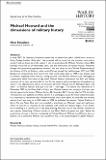Files in this item
Michael Howard and the dimensions of military history
Item metadata
| dc.contributor.author | Strachan, Hew | |
| dc.date.accessioned | 2021-01-11T12:30:01Z | |
| dc.date.available | 2021-01-11T12:30:01Z | |
| dc.date.issued | 2020-12-07 | |
| dc.identifier | 270748978 | |
| dc.identifier | 11746602-3769-4857-b644-612b837e9e4f | |
| dc.identifier | 000597394600002 | |
| dc.identifier | 85097271036 | |
| dc.identifier.citation | Strachan , H 2020 , ' Michael Howard and the dimensions of military history ' , War in History , vol. 27 , no. 4 , pp. 536-551 . https://doi.org/10.1177/0968344520915028 | en |
| dc.identifier.issn | 0968-3445 | |
| dc.identifier.uri | https://hdl.handle.net/10023/21258 | |
| dc.description.abstract | In early 2002, Sir Lawrence Freedman invited me to deliver that year’s Liddell Hart Lecture at King’s College London. Only after I had accepted, did he reveal that the invitation came with a caveat: I had no choice as to the subject. I was to speak about Sir Michael Howard, whose 80th birthday would fall on 29 November 2002, and the dimensions of military history. Freedman thought this particularly appropriate because I had just taken up the Chichele Professorship of the History of War at Oxford, a chair which Michael himself had held between 1977 and 1980. Despite his comparatively brief tenure of a chair which dates back to 1909, I was already used to scholars, especially from overseas, telling me that I had Michael Howard’s job. Belonging to a generation which had come of age when Michael Howard dominated the field, and deeply conscious of my own personal debt to him for his support and encouragement throughout my career, I was apprehensive, almost to the point of terror. Michael was an Olympian figure, and even – as Maurice Pearton once put it to me – ‘vice-regal’. The lecture was delivered on 3 December 2002 in the Great Hall at King’s, and Michael Howard was sitting in the front row, directly opposite the lectern. Michael died on 30 November 2019, the day after his 97th birthday. The lecture is now published in tribute to him. It is unchanged, except for minor editorial tweaks. It is important to remember that Michael revealed much more about his early life and wartime service than I was privy to in 2002 when in 2006 he published his memoir, Captain Professor: A Life in War and Peace. One story not included in that book was Michael’s recurrent nightmare, which he told me in response to the anecdote with which the lecture begins. In his dream, he is travelling in a London taxi in the early evening. He looks out of the vehicle’s window to see a poster, advertising a Mozart concert at the Albert Hall to be given that night. Below the programme of music is the line, ‘conducted by Michael Howard’. Michael loved Mozart, but as a listener, not a performer. Michael too could know fear, as he acknowledged in Captain Professor. | |
| dc.format.extent | 16 | |
| dc.format.extent | 114860 | |
| dc.language.iso | eng | |
| dc.relation.ispartof | War in History | en |
| dc.subject | Michael Howard | en |
| dc.subject | Military history | en |
| dc.subject | Second World War | en |
| dc.subject | Clausewitz | en |
| dc.subject | War studies | en |
| dc.subject | D731 World War II | en |
| dc.subject | T-NDAS | en |
| dc.subject | SDG 16 - Peace, Justice and Strong Institutions | en |
| dc.subject.lcc | D731 | en |
| dc.title | Michael Howard and the dimensions of military history | en |
| dc.type | Journal article | en |
| dc.contributor.institution | University of St Andrews. School of International Relations | en |
| dc.identifier.doi | https://doi.org/10.1177/0968344520915028 | |
| dc.description.status | Peer reviewed | en |
This item appears in the following Collection(s)
Items in the St Andrews Research Repository are protected by copyright, with all rights reserved, unless otherwise indicated.

